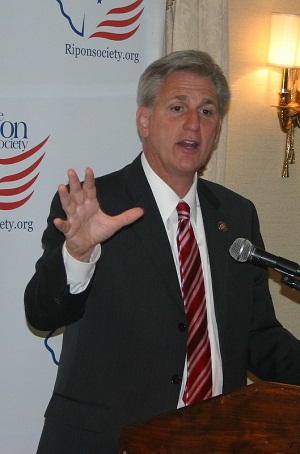Notes that Republicans have 430 House candidates on the ballot in 2010 – the most ever in GOP history, and the most ever for either party in over 30 years
 WASHINGTON, D.C. – One of the architects of the GOP’s drive to retake the House of Representatives appeared before a luncheon meeting of The Ripon Society yesterday, giving a speech in which he reported that the GOP not only has fielded more candidates than it ever has before in the party’s history, but more candidates than either party has fielded in over 30 years.
WASHINGTON, D.C. – One of the architects of the GOP’s drive to retake the House of Representatives appeared before a luncheon meeting of The Ripon Society yesterday, giving a speech in which he reported that the GOP not only has fielded more candidates than it ever has before in the party’s history, but more candidates than either party has fielded in over 30 years.
“Since 1920,” stated California Congressman Kevin McCarthy, “there have been 45 races for Congress outside of this one. Only six times out of the 45 have Republicans ever out-recruited Democrats by having more candidates. They only did it twice when they were in the minority – in 1992 and 1994, both good years for Republicans. We’ve out-recruited the Democrats this time. In 1994, we had 421 candidates … [This year] we have 430 – the most in the history of the Republican Party, and the most in either party for over 30 years.”
McCarthy, a two-term Congressman who also serves as Chief Deputy Whip, headed up recruitment efforts for House Republicans this year. In his speech to The Ripon Society, McCarthy discussed some of the extensive work and innovative preparation that went into the effort
“We’d meet every single Thursday,” he said. “You’d look at the voting history of the district. You’d put the Census data over the top since you’re at the end of the cycle. But I also did something different – I took the MRA book, and I put in the data to see how often they went home and how much money they spent on communications. Because I have this theory — I call it the McCarthy Theory. I want to check in a wave election who do you sneak up on. So I’m checking to see if there is a direct correlation to how much money you spend communicating and how often you go home.
“In 1994, we defeated 15 percent of every Democrat incumbent. In 2006, they defeated 10 percent of every Republican incumbent. So the incumbency factor in a big wave is somewhere between 10 and 15 percent. This is the McCarthy Theory if it plays out. Who do you hit, and who do you catch in a wave election? My theory goes, after five terms is when you’re going to catch someone. Because the first two terms you come here, you bring staff from your own district. You’re not on an ‘A’ committee. On average, you spend $250,000 on communications back home. You go home more. And you get challenged, but normally you win.”

McCarthy’s Theory states that a longer a member of Congress is in office, the more likely it is that his or her legislative priorities – and legislative expenditures — will shift. For example, as members gain in seniority and win new committee assignments, they are more likely to shift their expenditures from communication with their districts to higher salaries for their staffs. At the same time, McCarthy noted, “you’re winning with higher numbers than you’ve ever won before and you think everybody loves you. The world’s great. You’re raising less money back home and more in the PAC community. That’s when you’re vulnerable.”
According to McCarthy, this approach helped Republicans determine which incumbents to target and which challengers to recruit. He specifically pointed to veteran Tennessee Congressmen John Tanner and Bart Gordon, Arkansas Congressman Vic Snyder and Wisconsin Congressman (and Appropriations Committee Chairman) David Obey as longtime Democratic incumbents who were not only vulnerable, but who chose to retire in the face of a serious challenge from a GOP recruit. He also pointed to California Democrat Loretta Sanchez as another long-time incumbent who faces a serious challenge from her Republican opponent, Van Tran.
In addition to his role as head of the GOP’s recruitment effort, McCarthy also spearheaded another critical initiative this year – the America Speaking Out initiative, which developed the issues and helped lay the foundation for the Pledge to America, which House Republicans released last week. “We went out and talked to the American people,” McCarthy stated in describing how the GOP developed the plan. “What do we talk about? The only things that the public is talking about – jobs, spending and reforming the institution.”
He then recited the opening lines of the Pledge: “America is more than a country. America is an idea.” “The preamble tells us where our hearts are and where we are going to go,” he said of the document. “The plan tells us what we’re going to do.”
Part 1:
Part 2:
The Ripon Society is a public policy organization that was founded in 1962 and takes its name from the town where the Republican Party was born in 1854 — Ripon, Wisconsin. One of the main goals of The Ripon Society is to promote the ideas and principles that have made America great and contributed to the GOP’s past success. These ideas include keeping our nation secure, keeping taxes low and having a federal government that is smaller, smarter and more accountable to the people.



